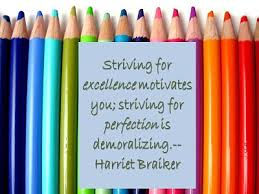 When I was a solo I was also a perfectionist. I thought every piece of work I did had to be perfect, and couldn’t leave my desk until it was. I also thought this was a perfect way to run a law practice, but it was not.
When I was a solo I was also a perfectionist. I thought every piece of work I did had to be perfect, and couldn’t leave my desk until it was. I also thought this was a perfect way to run a law practice, but it was not.
I was grasping for something that doesn’t exist. Perfection is an illusion. It is also the mother of paranoia, procrastination and smugness. Mindfulness taught me to aim for excellence instead of perfection. Excellence is a much better practice.
There are many perfectionists in law, partly because we’re drawn to its structure, partly because of our training. Everything we produce has to be absolutely right, and the slightest misstep is grounds for ridicule, or even being fired by our client.
But perfectionism speaks to a certain…paranoia. Excellence, on the other hand, is aspirational.
Perfectionists do excellent work but we rarely feel we’ve done enough. We’re afraid that if we let up, someone will see we’re not perfect. One remedy for this is to recall something recently that you did well but not perfectly. It could be in a case where the settlement was excellent but you didn’t wow the client. Or it could be last night at home, where your dinner was delicious but you were critical of one of the dishes.
If you’re doing an excellent job but focusing on what’s wrong, focus on what’s right instead. Contemplative neuroscience tells us that if we do this repeatedly we can re-wire our brains. Eventually, the new neural pathways that focus on excellence will become our default, our fear of imperfection will subside, and we’ll be able to see imperfection as simply human.
Procrastination is another trait of perfectionists. We have a hard time getting started. We worry! And we constantly second-guess ourselves. To remedy our own recalcitrance we need to start with aspirational but realistic goals. Then we can break things down into tasks, calendaring each one like an appearance. We all know what’s next: silence the phone and close the browsers. Now we can start small, stay focused, and build our sense of accomplishment as we complete each task.
Then we can use a mindfulness practice to address the worry. The best way to do this is by bringing awareness to the body, locating the tightness worry creates. Simply by paying attention, the body will relax, but don’t take my word for it. Try this at home. And at work. As you start to relax the body, the worry subsides as well. What takes its place? Space in the mind for planning and execution.
Meanwhile, our inner critic is the culprit on second-guessing. So before you invite her to rethink something for the dozenth time, take a look at the work you’ve already done. If it’s great – which I’ll bet it is – say to yourself, “Good job!” You can even slap your desk or do a little victory wiggle in your chair – whatever it takes to acknowledge your own excellence. As you do this over and over, you’re quieting your inner critic, so you can stop procrastinating and get the job done.
Once you’ve mastered focusing on what’s right and letting go of procrastination, there’s one more thing to watch out for if you’re a perfectionist: self-satisfaction. As much as we hate to admit it, we perfectionists are happy when someone else fails. We look at their loss and think, “Whew! At least it wasn’t me.”
Excellent solos don’t do this. When an excellent lawyer (who’s not a perfectionist) sees someone fail, especially if the “win” is theirs, they remember that the loss could have been theirs. Then they ask, “How can I reach out? How can I let my opponent know that my celebration isn’t at her expense?”
As you develop these kinds of responses you’re befriending your own imperfection, and cultivating compassion as an essential element of excellence. And you’re cultivating tolerance of imperfection as another essential element of being an excellent solo practitioner.
All opinions, advice, and experiences of guest bloggers/columnists are those of the author and do not necessarily reflect the opinions, practices or experiences of Solo Practice University®.





















The perfect is the enemy of the good.
So true, Mark. So true.